IBM
International Business Machines Corporation (IBM) is an American multinational technology company headquartered in Armonk, New York. It was founded in 1911 in Endicott, New York as the Computing-Tabulating-Recording Company (CTR) and was renamed "International Business Machines" in 1924. IBM is incorporated in New York and has operations in over 170 countries[5]
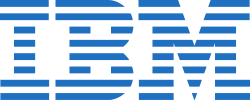 | |
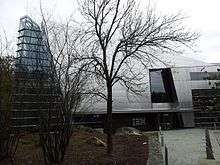 IBM headquarters in Armonk, New York | |
| IBM | |
| Public | |
| Traded as | |
| ISIN | US4592001014 |
| Industry | Cloud computing Artificial intelligence Computer hardware Computer software |
| Predecessors | Bundy Manufacturing Company Computing Scale Company of America International Time Recording Company Tabulating Machine Company |
| Founded | June 16, 1911 (as Computing-Tabulating-Recording Company) Endicott, New York, U.S.[1] |
| Founders | |
| Headquarters | , U.S. |
Area served | 177 countries[2] |
Key people | Ginni Rometty (Executive Chairman) Arvind Krishna (CEO) Jim Whitehurst (President) |
| Products | See IBM products |
| Services | |
| Revenue | |
| Total assets | |
| Total equity | |
Number of employees | 352,600 (2019)[4] |
| Website | ibm |
IBM produces and sells computer hardware, middleware and software, and provides hosting and consulting services in areas ranging from mainframe computers to nanotechnology. It is also a major research organization, as of 2020 holding the record for most U.S. patents generated by a business for 27 consecutive years.[6] Inventions by IBM include the automated teller machine (ATM), the floppy disk, the hard disk drive, the magnetic stripe card, the relational database, the SQL programming language, the UPC barcode, and dynamic random-access memory (DRAM). The IBM mainframe, exemplified by the System/360, was the dominant computing platform during the 1960s and 1970s.
IBM has continually shifted business operations by focusing on higher-value, more profitable markets. This includes spinning off printer manufacturer Lexmark in 1991 and the sale of personal computer (ThinkPad/ThinkCentre) and x86-based server businesses to Lenovo (in 2005 and 2014, respectively), and acquiring companies such as PwC Consulting (2002), SPSS (2009), The Weather Company (2016), and Red Hat (2019). In 2015, IBM announced that it would go "fabless", continuing to design semiconductors, but offloading manufacturing to GlobalFoundries.
Nicknamed Big Blue, IBM is one of 30 companies included in the Dow Jones Industrial Average and one of the world's largest employers, with over 352,600 employees as of 2018. At least 70% of IBM employees, known as "IBMers", are based outside the United States, with the largest number in India.[7] IBM employees have been awarded five Nobel Prizes, six Turing Awards, ten National Medals of Technology (USA) and five National Medals of Science (USA).
History
In the 1880s technologies emerged that would ultimately form the core of International Business Machines (IBM). Julius E. Pitrap patented the computing scale in 1885;[8] Alexander Dey invented the dial recorder (1888);[9] Herman Hollerith (1860–1929) patented the Electric Tabulating Machine;[10] and Willard Bundy invented a time clock to record a worker's arrival and departure time on a paper tape in 1889.[11] On June 16, 1911, their four companies were amalgamated in New York State by Charles Ranlett Flint forming a fifth company, the Computing-Tabulating-Recording Company (CTR) based in Endicott, New York.[1][12] The five companies had 1,300 employees and offices and plants in Endicott and Binghamton, New York; Dayton, Ohio; Detroit, Michigan; Washington, D.C.; and Toronto.
They manufactured machinery for sale and lease, ranging from commercial scales and industrial time recorders, meat and cheese slicers, to tabulators and punched cards. Thomas J. Watson, Sr., fired from the National Cash Register Company by John Henry Patterson, called on Flint and, in 1914, was offered a position at CTR.[13] Watson joined CTR as General Manager then, 11 months later, was made President when court cases relating to his time at NCR were resolved.[14] Having learned Patterson's pioneering business practices, Watson proceeded to put the stamp of NCR onto CTR's companies.[15] He implemented sales conventions, "generous sales incentives, a focus on customer service, an insistence on well-groomed, dark-suited salesmen and had an evangelical fervor for instilling company pride and loyalty in every worker".[16][17] His favorite slogan, "THINK", became a mantra for each company's employees.[16] During Watson's first four years, revenues reached $9 million ($133 million today) and the company's operations expanded to Europe, South America, Asia and Australia.[16] Watson never liked the clumsy hyphenated name "Computing-Tabulating-Recording Company" and on February 14, 1924, chose to replace it with the more expansive title "International Business Machines".[18] By 1933 most of the subsidiaries had been merged into one company, IBM.[19]

In 1937 IBM's tabulating equipment enabled organizations to process huge amounts of data. Its clients included the U.S. Government, during its first effort to maintain the employment records for 26 million people pursuant to the Social Security Act,[20] and Hitler's Third Reich,[21][22] for the tracking of Jews and other persecuted groups, largely through the German subsidiary Dehomag. The social security-related business gave an 81% increase in revenue from 1935 to 1939.[23]
In 1949 Thomas Watson, Sr., created IBM World Trade Corporation, a subsidiary of IBM focused on foreign operations.[24] In 1952 he stepped down after almost 40 years at the company helm, and his son Thomas Watson, Jr. was named president. In 1956 the company demonstrated the first practical example of artificial intelligence when Arthur L. Samuel of IBM's Poughkeepsie, New York, laboratory programmed an IBM 704 not merely to play checkers but "learn" from its own experience. In 1957 the FORTRAN scientific programming language was developed. In 1961 IBM developed the SABRE reservation system for American Airlines and introduced the highly successful Selectric typewriter.
In 1963 IBM employees and computers helped NASA track the orbital flights of the Mercury astronauts. A year later, it moved its corporate headquarters from New York City to Armonk, New York. The latter half of the 1960s saw IBM continue its support of space exploration, participating in the 1965 Gemini flights, 1966 Saturn flights, and 1969 lunar mission.
In 1969, IBM engineer Forrest Parry invented the magnetic stripe card that would become ubiquitous for credit/debit/ATM cards, driver's licenses, rapid transit cards, and a multitude of other identity and access control applications. IBM pioneered the manufacture of these cards, and for most of the 1970s, the data processing systems and software for such applications ran exclusively on IBM computers.

On April 7, 1964, IBM announced the first computer system family, the IBM System/360. It spanned the complete range of commercial and scientific applications from large to small, allowing companies to upgrade to models with greater computing capability without having to rewrite their applications. It was followed by the IBM System/370 in 1970. Together the 360 and 370 made the IBM mainframe the dominant mainframe computer and the dominant computing platform in the industry throughout this period and into the early 1980s.
In 1974 IBM engineer George J. Laurer developed the Universal Product Code.[25] IBM and the World Bank first introduced financial swaps to the public in 1981 when they entered into a swap agreement.[26] The IBM PC, originally designated IBM 5150, was introduced in 1981, and it soon became an industry standard. In 1991 IBM spun out its printer manufacturing into a new business called Lexmark.
In 1993 IBM posted a US$8 billion loss – at the time the biggest in American corporate history.[27] Lou Gerstner was hired as CEO from RJR Nabisco to turn the company around.[28] In 2002 IBM acquired PwC consulting, and in 2003 it initiated a project to redefine company values, hosting a three-day online discussion of key business issues with 50,000 employees. The result was three values: "Dedication to every client's success", "Innovation that matters—for our company and for the world", and "Trust and personal responsibility in all relationships".[29][30]
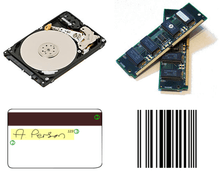
In 2005 the company sold its personal computer business to Chinese technology company Lenovo[31] and, in 2009, it acquired software company SPSS Inc. Later in 2009, IBM's Blue Gene supercomputing program was awarded the National Medal of Technology and Innovation by U.S. President Barack Obama. In 2011, IBM gained worldwide attention for its artificial intelligence program Watson, which was exhibited on Jeopardy! where it won against game-show champions Ken Jennings and Brad Rutter. The company also celebrated its 100th anniversary in the same year on June 16. In 2012 IBM announced it has agreed to buy Kenexa, and a year later it also acquired SoftLayer Technologies, a web hosting service, in a deal worth around $2 billion.[32] Also that year, the company designed a video surveillance system for Davao City.[33]
In 2014 IBM announced it would sell its x86 server division to Lenovo for $2.1 billion.[34] Also that year, IBM began announcing several major partnerships with other companies, including Apple Inc.,[35][36] Twitter,[37] Facebook,[38] Tencent,[39] Cisco,[40] UnderArmour,[41] Box,[42] Microsoft,[43] VMware,[44] CSC,[45] Macy's,[46] Sesame Workshop,[47] the parent company of Sesame Street, and Salesforce.com.[48]
In 2015 IBM announced three major acquisitions: Merge Healthcare for $1 billion,[49] data storage vendor Cleversafe, and all digital assets from The Weather Company, including Weather.com and the Weather Channel mobile app.[50][51] Also that year, IBMers created the film A Boy and His Atom, which was the first molecule movie to tell a story. In 2016, IBM acquired video conferencing service Ustream and formed a new cloud video unit.[52][53] In April 2016, it posted a 14-year low in quarterly sales.[54] The following month, Groupon sued IBM accusing it of patent infringement, two months after IBM accused Groupon of patent infringement in a separate lawsuit.[55]
In 2015, IBM bought the digital part of The Weather Company;[56] and in October 2018, IBM announced its intention to acquire Red Hat for $34 billion,[57][58][59] which was completed on July 9, 2019.[60]
Headquarters and offices


IBM is headquartered in Armonk, New York, a community 37 miles (60 km) north of Midtown Manhattan.[61] A nickname for the company is the "Colossus of Armonk".[62] Its principal building, referred to as CHQ, is a 283,000-square-foot (26,300 m2) glass and stone edifice on a 25-acre (10 ha) parcel amid a 432-acre former apple orchard the company purchased in the mid-1950s.[63] There are two other IBM buildings within walking distance of CHQ: the North Castle office, which previously served as IBM's headquarters; and the Louis V. Gerstner, Jr., Center for Learning[64] (formerly known as IBM Learning Center (ILC)), a resort hotel and training center, which has 182 guest rooms, 31 meeting rooms, and various amenities.[65]
IBM operates in 174 countries as of 2016,[2] with mobility centers in smaller markets areas and major campuses in the larger ones. In New York City, IBM has several offices besides CHQ, including the IBM Watson headquarters at Astor Place in Manhattan. Outside of New York, major campuses in the United States include Austin, Texas; Research Triangle Park (Raleigh-Durham), North Carolina; Rochester, Minnesota; and Silicon Valley, California.
IBM's real estate holdings are varied and globally diverse. Towers occupied by IBM include 1250 René-Lévesque (Montreal, Canada) and One Atlantic Center (Atlanta, Georgia, USA). In Beijing, China, IBM occupies Pangu Plaza,[66] the city's seventh tallest building and overlooking Beijing National Stadium ("Bird's Nest"), home to the 2008 Summer Olympics.
IBM India Private Limited is the Indian subsidiary of IBM, which is headquartered at Bengaluru, Karnataka. It has facilities in Bengaluru, Ahmedabad, Delhi, Kolkata, Mumbai, Chennai, Pune, Gurugram, Noida, Bhubaneshwar, Coimbatore, Visakhapatnam and Hyderabad.
Other notable buildings include the IBM Rome Software Lab (Rome, Italy), Hursley House (Winchester, UK), 330 North Wabash (Chicago, Illinois, United States), the Cambridge Scientific Center (Cambridge, Massachusetts, United States), the IBM Toronto Software Lab (Toronto, Canada), the IBM Building, Johannesburg (Johannesburg, South Africa), the IBM Building (Seattle) (Seattle, Washington, United States), the IBM Hakozaki Facility (Tokyo, Japan), the IBM Yamato Facility (Yamato, Japan), the IBM Canada Head Office Building (Ontario, Canada) and the Watson IoT Headquarters[67] (Munich, Germany). Defunct IBM campuses include the IBM Somers Office Complex (Somers, New York) and Tour Descartes (Paris, France). The company's contributions to industrial architecture and design include works by Marcel Breuer, Eero Saarinen, Ludwig Mies van der Rohe and I.M. Pei. Van der Rohe's building in Chicago was recognized with the 1990 Honor Award from the National Building Museum.[68]
IBM was recognized as one of the Top 20 Best Workplaces for Commuters by the United States Environmental Protection Agency (EPA) in 2005, which recognized Fortune 500 companies that provided employees with excellent commuter benefits to help reduce traffic and air pollution.[69] In 2004, concerns were raised related to IBM's contribution in its early days to pollution in its original location in Endicott, New York.[70][71]
Finance
For the fiscal year 2017, IBM reported earnings of US$5.7 billion, with an annual revenue of US$79.1 billion, a decline of 1.0% over the previous fiscal cycle. IBM's shares traded at over $125 per share, and its market capitalization was valued at over US$113.9 billion in September 2018.[72] IBM ranked No. 34 on the 2018 Fortune 500 rankings of the largest United States corporations by total revenue.[73]
| Year | Revenue in mil. US$ |
Net income in mil. US$ |
Total Assets in mil. US$ |
Price per Share in US$ |
Employees |
|---|---|---|---|---|---|
| 2005 | 91,134 | 7,934 | 105,748 | 61.80 | |
| 2006 | 91,424 |
9,492 | 103,234 | 62.01 | |
| 2007 | 98,786 |
10,418 | 120,431 | 80.04 | |
| 2008 | 103,630 |
12,334 | 109,524 | 84.49 | |
| 2009 | 95,758 |
13,425 | 109,022 | 85.67 | |
| 2010 | 99,870 |
14,833 | 113,452 | 105.32 | |
| 2011 | 106,916 |
15,855 | 116,433 | 138.97 | |
| 2012 | 102,874 |
16,604 | 119,213 | 162.46 | |
| 2013 | 98,367 |
16,483 | 126,223 | 163.30 | 431,212 |
| 2014 | 92,793 |
12,022 | 117,271 | 156.69 | 379,592 |
| 2015 | 81,741 |
13,190 | 110,495 | 137.27 | 377,757 |
| 2016 | 79,919 |
11,872 | 117,470 | 138.09 | 380,300 |
| 2017 | 79,139 |
5,753 | 125,356 | 149.76 | 366,600 |
| 2018 | 79,591 |
8,723 | 123,382 | 139.90 | 350,600 |
| 2019 | 77,100 |
9,400 | 152,186 | 126.85 | 352,600 |
Products and services
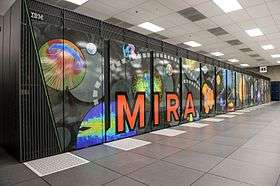
IBM has a large and diverse portfolio of products and services. As of 2016, these offerings fall into the categories of cloud computing, Artificial intelligence, commerce, data and analytics, Internet of Things (IoT),[74] IT infrastructure, mobile, Digital workplace[75] and security.[76]
IBM Cloud includes infrastructure as a service (IaaS), software as a service (SaaS) and platform as a service (PaaS) offered through public, private and hybrid cloud delivery models. For instance, the IBM Bluemix PaaS enables developers to quickly create complex websites on a pay-as-you-go model. IBM SoftLayer is a dedicated server, managed hosting and cloud computing provider, which in 2011 reported hosting more than 81,000 servers for more than 26,000 customers.[77] IBM also provides Cloud Data Encryption Services (ICDES), using cryptographic splitting to secure customer data.[78]
IBM also hosts the industry-wide cloud computing and mobile technologies conference InterConnect each year.[79]
Hardware designed by IBM for these categories include IBM's POWER microprocessors, which are employed inside many console gaming systems, including Xbox 360,[80] PlayStation 3, and Nintendo's Wii U.[81][82] IBM Secure Blue is encryption hardware that can be built into microprocessors,[83] and in 2014, the company revealed TrueNorth, a neuromorphic CMOS integrated circuit and announced a $3 billion investment over the following five years to design a neural chip that mimics the human brain, with 10 billion neurons and 100 trillion synapses, but that uses just 1 kilowatt of power.[84] In 2016, the company launched all-flash arrays designed for small and midsized companies, which includes software for data compression, provisioning, and snapshots across various systems.[85]
IT outsourcing also represents a major service provided by IBM, with more than 60 data centers worldwide.[86] alphaWorks is IBM's source for emerging software technologies, and SPSS is a software package used for statistical analysis. IBM's Kenexa suite provides employment and retention solutions, and includes the BrassRing, an applicant tracking system used by thousands of companies for recruiting.[87] IBM also owns The Weather Company, which provides weather forecasting and includes weather.com and Weather Underground.[88]
Smarter Planet is an initiative that seeks to achieve economic growth, near-term efficiency, sustainable development, and societal progress,[89][90] targeting opportunities such as smart grids,[91] water management systems,[92] solutions to traffic congestion,[93] and greener buildings.[94]
Services provisions include Redbooks, which are publicly available online books about best practices with IBM products, and developerWorks, a website for software developers and IT professionals with how-to articles and tutorials, as well as software downloads, code samples, discussion forums, podcasts, blogs, wikis, and other resources for developers and technical professionals.[95]
IBM Watson is a technology platform that uses natural language processing and machine learning to reveal insights from large amounts of unstructured data.[96] Watson was debuted in 2011 on the American game-show Jeopardy!, where it competed against champions Ken Jennings and Brad Rutter in a three-game tournament and won. Watson has since been applied to business, healthcare, developers, and universities. For example, IBM has partnered with Memorial Sloan Kettering Cancer Center to assist with considering treatment options for oncology patients and for doing melanoma screenings.[97] Also, several companies have begun using Watson for call centers, either replacing or assisting customer service agents.[98]
In January 2019, IBM introduced its first commercial quantum computer IBM Q System One.[99]
IBM also provides infrastructure for the New York City Police Department through their IBM Cognos Analytics to perform data visualizations of CompStat crime data.[100]
In March 2020 it was announced that IBM will build the first quantum computer in Germany. The computer should allow researchers to harness the technology without falling foul of the EU's increasingly assertive stance on data sovereignty.[101]
Research

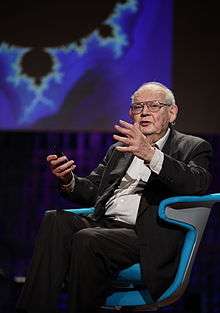
Research has been a part of IBM since its founding, and its organized efforts trace their roots back to 1945, when the Watson Scientific Computing Laboratory was founded at Columbia University in New York City, converting a renovated fraternity house on Manhattan's West Side into IBM's first laboratory. Now, IBM Research constitutes the largest industrial research organization in the world, with 12 labs on 6 continents.[102] IBM Research is headquartered at the Thomas J. Watson Research Center in New York, and facilities include the Almaden lab in California, Austin lab in Texas, Australia lab in Melbourne, Brazil lab in São Paulo and Rio de Janeiro, China lab in Beijing and Shanghai, Ireland lab in Dublin, Haifa lab in Israel, India lab in Delhi and Bangalore, Tokyo lab, Zurich lab and Africa lab in Nairobi.
In terms of investment, IBM's R&D expenditure totals several billion dollars each year. In 2012, that expenditure was approximately US$6.9 billion.[103] Recent allocations have included $1 billion to create a business unit for Watson in 2014, and $3 billion to create a next-gen semiconductor along with $4 billion towards growing the company's "strategic imperatives" (cloud, analytics, mobile, security, social) in 2015.[104]
IBM has been a leading proponent of the Open Source Initiative, and began supporting Linux in 1998.[105] The company invests billions of dollars in services and software based on Linux through the IBM Linux Technology Center, which includes over 300 Linux kernel developers.[106] IBM has also released code under different open source licenses, such as the platform-independent software framework Eclipse (worth approximately US$ million at the time of the donation),[107] the three-sentence International Components for Unicode (ICU) license, and the Java-based relational database management system (RDBMS) Apache Derby. IBM's open source involvement has not been trouble-free, however (see SCO v. IBM).
Famous inventions and developments by IBM include: the Automated teller machine (ATM), Dynamic random access memory (DRAM), the electronic keypunch, the financial swap, the floppy disk, the hard disk drive, the magnetic stripe card, the relational database, RISC, the SABRE airline reservation system, SQL, the Universal Product Code (UPC) bar code, and the virtual machine. Additionally, in 1990 company scientists used a scanning tunneling microscope to arrange 35 individual xenon atoms to spell out the company acronym, marking the first structure assembled one atom at a time.[108] A major part of IBM research is the generation of patents. Since its first patent for a traffic signaling device, IBM has been one of the world's most prolific patent sources. In 2018, the company holds the record for most patents generated by a business, marking 25 consecutive years for the achievement.[6]
Five IBMers have received the Nobel Prize: Leo Esaki, of the Thomas J. Watson Research Center in Yorktown Heights, N.Y., in 1973, for work in semiconductors; Gerd Binnig and Heinrich Rohrer, of the Zurich Research Center, in 1986, for the scanning tunneling microscope;[109] and Georg Bednorz and Alex Müller, also of Zurich, in 1987, for research in superconductivity. Several IBMers have also won the Turing Award, including the first female recipient Frances E. Allen.[110]
Current research includes a collaboration with the University of Michigan to see computers act as an academic advisor for undergraduate computer science and engineering students at the university,[111] and a partnership with AT&T, combining their cloud and Internet of Things (IoT) platforms to make them interoperable and to provide developers with easier tools.[112]
The company is also involved in research into advanced algorithms and machine learning and their decision-making processes.[113] To that end, the company recently released an analysis tool for how and why algorithms make decisions while scanning for biases in automated decision-making.[114]
Brand and reputation
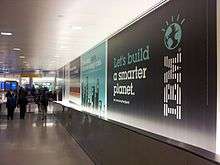
IBM is nicknamed Big Blue in part due to its blue logo and color scheme,[115][116] and also partially since IBM once had a de facto dress code of white shirts with blue suits.[115][117] The company logo has undergone several changes over the years, with its current "8-bar" logo designed in 1972 by graphic designer Paul Rand.[118] It was a general replacement for a 13-bar logo, since period photocopiers did not render large areas well. Aside from the logo, IBM used Helvetica as a corporate typeface for 50 years, until it was replaced in 2017 by the custom-designed IBM Plex.
IBM has a valuable brand as a result of over 100 years of operations and marketing campaigns. Since 1996, IBM has been the exclusive technology partner for the Masters Tournament, one of the four major championships in professional golf, with IBM creating the first Masters.org (1996), the first course cam (1998), the first iPhone app with live streaming (2009), and first-ever live 4K Ultra High Definition feed in the United States for a major sporting event (2016).[119] As a result, IBM CEO Ginni Rometty became the third female member of the Master's governing body, the Augusta National Golf Club.[120] IBM is also a major sponsor in professional tennis, with engagements at the U.S. Open, Wimbledon, the Australian Open, and the French Open.[121] The company also sponsored the Olympic Games from 1960–2000,[122] and the National Football League from 2003–2012.[123]
In 2012, IBM's brand was valued at $75.5 billion and ranked by Interbrand as the second-best brand worldwide.[124] That same year, it was also ranked the top company for leaders (Fortune), the number two green company in the U.S. (Newsweek),[125] the second-most respected company (Barron's),[126] the fifth-most admired company (Fortune), the 18th-most innovative company (Fast Company), and the number one in technology consulting and number two in outsourcing (Vault).[127] In 2015, Forbes ranked IBM the fifth-most valuable brand.[128]
People and culture
Employees

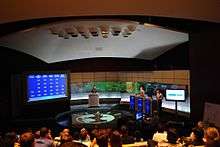
IBM has one of the largest workforces in the world, and employees at Big Blue are referred to as "IBMers". The company was among the first corporations to provide group life insurance (1934), survivor benefits (1935), training for women (1935), paid vacations (1937), and training for disabled people (1942). IBM hired its first black salesperson in 1946, and in 1952, CEO Thomas J. Watson, Jr. published the company's first written equal opportunity policy letter, one year before the U.S. Supreme Court decision in Brown vs. Board of Education and 11 years before the Civil Rights Act of 1964. The Human Rights Campaign has rated IBM 100% on its index of gay-friendliness every year since 2003,[129] with IBM providing same-sex partners of its employees with health benefits and an anti-discrimination clause. Additionally, in 2005, IBM became the first major company in the world to commit formally to not use genetic information in employment decisions; and in 2017, IBM was named to Working Mother's 100 Best Companies List for the 32nd consecutive year.[130]
IBM has several leadership development and recognition programs to recognize employee potential and achievements. For early-career high potential employees, IBM sponsors leadership development programs by discipline (e.g., general management (GMLDP), human resources (HRLDP), finance (FLDP)). Each year, the company also selects 500 IBMers for the IBM Corporate Service Corps (CSC),[131] which has been described as the corporate equivalent of the Peace Corps and gives top employees a month to do humanitarian work abroad.[132] For certain interns, IBM also has a program called Extreme Blue that partners top business and technical students to develop high-value technology and compete to present their business case to the company's CEO at internship's end.[133]
The company also has various designations for exceptional individual contributors such as Senior Technical Staff Member (STSM), Research Staff Member (RSM), Distinguished Engineer (DE), and Distinguished Designer (DD).[134] Prolific inventors can also achieve patent plateaus and earn the designation of Master Inventor. The company's most prestigious designation is that of IBM Fellow. Since 1963, the company names a handful of Fellows each year based on technical achievement. Other programs recognize years of service such as the Quarter Century Club established in 1924, and sellers are eligible to join the Hundred Percent Club, composed of IBM salesmen who meet their quotas, convened in Atlantic City, New Jersey. Each year, the company also selects 1,000 IBMers annually to award the Best of IBM Award, which includes an all-expenses-paid trip to the awards ceremony in an exotic location.
IBM's culture has evolved significantly over its century of operations. In its early days, a dark (or gray) suit, white shirt, and a "sincere" tie constituted the public uniform for IBM employees.[135] During IBM's management transformation in the 1990s, CEO Louis V. Gerstner, Jr. relaxed these codes, normalizing the dress and behavior of IBM employees.[136] The company's culture has also given to different plays on the company acronym (IBM), with some saying is stands for "I've Been Moved" due to relocations and layoffs,[137] others saying it stands for "I'm By Myself" pursuant to a prevalent work-from-anywhere norm,[138] and others saying it stands for "I'm Being Mentored" due to the company's open door policy and encouragement for mentoring at all levels.[139] In terms of labor relations, the company has traditionally resisted labor union organizing,[140] although unions represent some IBM workers outside the United States.[141] In Japan, IBM employees also have an American football team complete with pro stadium, cheerleaders and televised games, competing in the Japanese X-League as the "Big Blue".[142]
In 2015, IBM started giving employees the option of choosing either a PC or a Mac as their primary work device, resulting in IBM becoming the world's largest Mac shop.[143] In 2016, IBM eliminated forced rankings and changed its annual performance review system to focus more on frequent feedback, coaching, and skills development.[144]
IBM alumni
Many IBMers have also achieved notability outside of work and after leaving IBM. In business, former IBM employees include Apple Inc. CEO Tim Cook,[145] former EDS CEO and politician Ross Perot, Microsoft chairman John W. Thompson, SAP co-founder Hasso Plattner, Gartner founder Gideon Gartner, Advanced Micro Devices (AMD) CEO Lisa Su,[146] former Citizens Financial Group CEO Ellen Alemany, former Yahoo! chairman Alfred Amoroso, former AT&T CEO C. Michael Armstrong, former Xerox Corporation CEOs David T. Kearns and G. Richard Thoman,[147] former Fair Isaac Corporation CEO Mark N. Greene,[148] Citrix Systems co-founder Ed Iacobucci, ASOS.com chairman Brian McBride, former Lenovo CEO Steve Ward, and former Teradata CEO Kenneth Simonds.
In government, alumna Patricia Roberts Harris served as United States Secretary of Housing and Urban Development, the first African American woman to serve in the United States Cabinet.[149] Samuel K. Skinner served as U.S. Secretary of Transportation and as the White House Chief of Staff. Alumni also include U.S. Senators Mack Mattingly and Thom Tillis; Wisconsin governor Scott Walker;[150] former U.S. Ambassadors Vincent Obsitnik (Slovakia), Arthur K. Watson (France), and Thomas Watson Jr. (Soviet Union); and former U.S. Representatives Todd Akin,[151] Glenn Andrews, Robert Garcia, Katherine Harris,[152] Amo Houghton, Jim Ross Lightfoot, Thomas J. Manton, Donald W. Riegle Jr., and Ed Zschau.
Others are NASA astronaut Michael J. Massimino, Canadian astronaut and Governor-General Julie Payette, Harvey Mudd College president Maria Klawe, Western Governors University president emeritus Robert Mendenhall, former University of Kentucky president Lee T. Todd Jr., NFL referee Bill Carollo,[153] former Rangers F.C. chairman John McClelland, and recipient of the Nobel Prize in Literature J. M. Coetzee. Thomas Watson Jr. also served as the 11th national president of the Boy Scouts of America.
Board and shareholders
The company's 15 member Board of Directors are responsible for overall corporate management and includes the current or former CEOs of Anthem, Dow Chemical, Johnson and Johnson, Royal Dutch Shell, UPS, and Vanguard as well as the presidents of Cornell University and Rensselaer Polytechnic Institute, and a retired U.S. Navy admiral.[154]
In 2011, IBM became the first technology company Warren Buffett's holding company Berkshire Hathaway invested in.[155] Initially he bought 64 million shares costing 10.5 billion dollars. Over the years he increased his IBM holdings however he reduced it by 94.5% to 2.05 million shares at the end of 2017. By May 2018 he was completely out of IBM.[156]
See also
- List of electronics brands
- List of largest Internet companies
- List of largest manufacturing companies by revenue
- Tech companies in the New York City metropolitan region
- Top 100 US Federal Contractors
References
- "Certificate of Incorporation of Computing-Tabulating-Recording-Co", Appendix to Hearings Before the Committee on Patents, House of Representatives, Seventy-Fourth Congress, on H. R. 4523, Part III, United States Government Printing Office, 1935 [Incorporation paperwork filed June 16, 1911]
- "IBM Is Blowing Up Its Annual Performance Review". Fortune. February 1, 2016. Retrieved July 22, 2016.
- "IBM Corporation Financials Statements" (PDF). IBM. January 21, 2020.
- "2019 IBM Annual Report" (PDF). IBM.com.
- "10-K". 10-K. Retrieved June 1, 2019.
- "US Patents Hit Record". TechCrunch. Retrieved January 15, 2020.
- Goel, Vindu (September 28, 2017). "IBM Now Has More Employees in India Than in the U.S." – via NYTimes.com.
- Aswad, Ed; Meredith, Suzanne (2005). Images of America: IBM in Endicott. Arcadia Publishing. ISBN 0-7385-3700-4.
- "Dey dial recorder, early 20th century". UK Science Museum. Retrieved December 30, 2010.
- "Hollerith 1890 Census Tabulator". Columbia University. Retrieved December 30, 2010.
- "Employee Punch Clocks". Florida Time Clock. Archived from the original on July 11, 2011. Retrieved December 30, 2010.
- "Tabulating Concerns Unite: Flint & Co. Bring Four Together with $19,000,000 capital" (PDF). The New York Times. June 10, 1911.
- Belden, Thomas Graham; Belden, Marva Robins (1962). The Lengthening Shadow: The Life of Thomas J. Watson. Little, Brown and Co. pp. 89–93.
- NCR Corporation#Expansion
- Belden (1962) p.105
- "Chronological History of IBM, 1910s". IBM. Retrieved January 30, 2015.
- Marcosson, Isaac F. (1945). Wherever Men Trade: The Romance of the Cash Register. Dodd, Mead.
- Belden (1962) p.125
- (Rodgers, THINK, p.83)
- DeWitt, Larry (April 2000). "Early Automation Challenges for SSA". Retrieved March 2, 2011.
- "IBM Statement on Nazi-era Book and Lawsuit". IBM Press room. February 14, 2001.
- "This Is the Hidden Nazi History of IBM — And the Man Who Tried to Expose It". Tech.Mic.
- "*IBM: The Rise and Fall and Reinvention of a Global Icon*". Marginal REVOLUTION. February 26, 2019.
- "The Creation of the World Trade Corporation". IBM.com. IBM Corp. Retrieved June 8, 2016.
- "The history of the UPC bar code and how the bar code symbol and system became a world standard". Cummingsdesign. Retrieved May 17, 2011.
- Ross; Westerfield; Jordan (2010). Fundamentals of Corporate Finance (9th, alternate ed.). McGraw Hill. p. 746.
- Lefever, Guy; Pesanello, Michele; Fraser, Heather; Taurman, Lee (2011). "Life science: Fade or flourish ?" (PDF). p. 2: IBM Institute for Business Value. Archived from the original (PDF) on February 23, 2014. Retrieved July 6, 2013.CS1 maint: location (link)
- "IBM Archives: Louis V. Gerstner, Jr". www.ibm.com. January 23, 2003.
- "IBM About IBM – United States". Retrieved May 28, 2015.
- "Leading Change When Business Is Good: The HBR Interview—Samuel J. Palmisano". Harvard Business Review. Harvard University Press. December 2004.
- "Lenovo Completes Acquisition Of IBM's Personal Computing Division". IBM.
- Saba, Jennifer (June 5, 2013). "IBM to buy website hosting service SoftLayer". Reuters.
- "Inside the Video Surveillance Program IBM Built for Philippine Strongman Rodrigo Duterte".
- "Lenovo says $2.1 billion IBM x86 server deal to close on Wednesday" (Press release). Reuters. September 29, 2014.
- "Apple + IBM". IBM. Retrieved July 18, 2014.
- Etherington, Darrell (July 15, 2014). "Apple Teams Up With IBM For Huge, Expansive Enterprise Push". Tech Crunch. Retrieved July 18, 2014.
- "Landmark IBM Twitter partnership to help businesses make decisions". Market Business News. November 2, 2014.
- Ha, Anthony. "IBM Announces Marketing Partnership With Facebook". TechCrunch. Retrieved August 13, 2016.
- Kyung-Hoon, Kim. "Tencent teams up with IBM to offer business software over the cloud". Reuters. Retrieved August 13, 2016.
- Vanian, Jonathan. "Cisco and IBM's New Partnership Is a Lot About Talk". Fortune. Retrieved August 13, 2016.
- Terdiman, Daniel. "IBM, Under Armour Team Up To Bring Cognitive Computing To Fitness Apps". Fast Company. Retrieved August 13, 2016.
- Franklin Jr., Curtis. "IBM, Box Cloud Partnership: What It Means". Information Week. Retrieved August 13, 2016.
- Weinberger, Matt. "Microsoft just made a deal with IBM — and Apple should be nervous". Business Insider. Retrieved August 13, 2016.
- Forrest, Conner. "VMware and SugarCRM expand partnerships with IBM, make services available on IBM Cloud". Tech Republic. Retrieved August 13, 2016.
- Taft, Darryl. "IBM, CSC Expand Their Cloud Deal to the Mainframe". eWeek. Retrieved August 13, 2016.
- Taft, Darryl. "Macy's Taps IBM, Satisfi for In-Store Shopping Companion". eWeek. Retrieved August 13, 2016.
- Toppo, Greg. "Sesame Workshop, IBM partner to use Watson for preschoolers". USA Today. Retrieved August 13, 2016.
- Nusca, Andrea. "IBM, Salesforce Strike Global Partnership on Cloud, AI". Fortune. Retrieved March 7, 2017.
- "IBM Buys Merge Healthcare to Boost Watson Health Cloud". Bloomberg. August 6, 2015.
- "IBM Agrees to Acquire Weather Channel's Digital Assets". Bloomberg. Retrieved October 28, 2015.
- "IBM to Acquire the Weather Company". The New York Times. Retrieved October 28, 2015.
- "IBM acquires Ustream, launches cloud video unit". USA Today. January 21, 2016.
- McLain, Tilly (January 21, 2016). "IBM Acquires Ustream: Behind the Acquisition". Ustream Online Video Blog. Archived from the original on January 22, 2016. Retrieved August 22, 2016.
- Egan, Matt (April 19, 2016). "Big Blue isn't so big anymore". CNN Money. Retrieved April 22, 2016.
- Stempel, Jonathan (May 9, 2016). "Groupon sues 'once-great' IBM over patent". Reuters. Retrieved May 9, 2016.
- Goldman, David (October 28, 2015). "IBM Buys Digital Part of The Weather Company". CNN Money. Retrieved November 27, 2019.
- Greene, Jay; McMillan, Robert (October 28, 2018). "IBM to Acquire Red Hat for About $33 Billion". Wall Street Journal. ISSN 0099-9660. Retrieved October 29, 2018.
- Hammond, Ed; Porter, Kiel; Barinka, Alex. "IBM Nears Deal to Acquire Software Maker Red Hat". www.bloomberg.com. Retrieved October 28, 2018.
- "IBM to Acquire Red Hat". Retrieved October 28, 2018.
- "IBM Closes Landmark Acquisition of Red Hat for $34 Billion; Defines Open, Hybrid Cloud Future". www.redhat.com. Retrieved July 9, 2019.
- "Contact Us". IBM. Retrieved October 20, 2009.
- Salmans, Sandra (January 9, 1982). "Dominance Ended, I.B.M. Fights Back". The New York Times. Retrieved January 2, 2015.
- Zuckerman, Laurence (September 17, 1997). "IBM's New Headquarters Reflects A Change in Corporate Style". The New York Times. Archived from the original on March 5, 2016. Retrieved August 22, 2016.
- "On the Dedication of the Louis V. Gerstner, Jr., Center for Learning – THINK Blog". IBM. Retrieved October 2, 2018.
- "Property Overview". Dolce Hotels and Resorts. Archived from the original on September 17, 2016. Retrieved August 12, 2016.
- "Company Overview of IBM China Company Limited". Bloomberg.
- "Watson IoT Headquarters". IBM. May 17, 2017.
- Forgey, Benjamin (March 24, 1990). "In the IBM Honoring the Corporation's Buildings". Washington Post.
- "Environmental Protection". IBM. May 3, 2008.
- "Village of Endicott Environmental Investigations". Retrieved January 28, 2015.
- Chittum, Samme (March 15, 2004). "In an I.B.M. Village, Pollution Fears Taint Relations With Neighbors". New York Times Online. Retrieved May 1, 2008.
- "IBM Revenue 2006–2018 | IBM". www.macrotrends.net. Retrieved October 28, 2018.
- "Fortune 500 Companies 2018: Who Made the List". Fortune. Retrieved November 9, 2018.
- "IBM Investing $3B in Internet of Things". PCMAG. Retrieved May 28, 2015.
- "Digital workplace services | IBM". Digital workplace services | IBM. Retrieved March 27, 2020.
- "IBM Products". IBM. Retrieved August 13, 2016.
- "Data Center Knowledge – SoftLayer: $78 Million in First Quarter Revenue". Retrieved August 14, 2016.
- "Cloud computing news: Security". ibm.com. October 21, 2015. Retrieved September 23, 2016.
- Lunden, Ingrid. "IBM Inks VMware, GitHub, Bitly Deals, Expands Apple Swift Use As It Doubles Down On The Cloud". TechCrunch. Retrieved August 14, 2016.
- "IBM delivers Power-based chip for Microsoft Xbox 360 worldwide launch". IBM. October 25, 2005.
- Staff Writer (June 8, 2011). "IBM microprocessors drive the new Nintendo WiiU console". mybroadband.co.za. Retrieved June 17, 2011.
- Leung, Isaac (June 8, 2011). "IBM's 45nm SOI microprocessors at core of Nintendo Wii U". Electronics News. Archived from the original on July 14, 2011. Retrieved June 17, 2011.
- "Building a smarter planet". Asmarterplanet.com. Retrieved May 23, 2010.
- "New research initiative sees IBM commit $3 bn". San Francisco News.Net. Archived from the original on July 14, 2014. Retrieved July 10, 2014.
- Dignan, Larry (August 23, 2016). "IBM launches flash arrays for smaller enterprises, aims to court EMC, Dell customers". ZDNet. Retrieved August 23, 2016.
- "IBM. Global locations for your global business". IBM.
- "Kenexa Corporation | Company Profile from Hoover's". Hoovers.com. Retrieved October 8, 2015.
- "IBM to Acquire the Weather Company". Retrieved September 19, 2018.
- Lohr, Steve (January 12, 2010). "Big Blue's Smarter Marketing Playbook". The New York Times. Retrieved August 8, 2010.
- Terdiman, Daniel (August 2, 2010). "At IBM Research, a constant quest for the bleeding edge". CNET News. Retrieved August 8, 2010.
- "Smart Grid". Archived from the original on April 9, 2011.
- "Smarter Water Management". Archived from the original on April 18, 2010.
- "Smart traffic". Archived from the original on May 4, 2010.
- "Smarter Buildings". Archived from the original on June 14, 2011.
- "About developerWorks". IBM developerWorks. Retrieved August 22, 2016.
- "What is Watson?". IBM. Retrieved August 13, 2016.
- "Watson Oncology". Memorial Sloan Kettering Cancer Center. Archived from the original on October 13, 2016. Retrieved August 13, 2016.
- Upbin, Bruce. "IBM's Watson Now A Customer Service Agent, Coming To Smartphones Soon". Forbes. Retrieved August 13, 2016.
- "IBM Unveils Q System One Quantum Computer". ExtremeTech. January 10, 2019.
- "NYPD changes the crime control equation by transforming the way it uses information" (PDF). Road Armonk, NY: IBM Corporation. Retrieved June 8, 2019.
- https://www.ft.com/content/83bfbfd3-0cd6-4f3a-9d98-4996f9295984
- "IBM Research: Global labs". Retrieved May 28, 2015.
- "IBM's expenditure on research and development from 2005 to 2015 (in billion U.S. dollars)". Statista. Retrieved August 12, 2016.
- Bort, Julie. "Ginni Rometty just set a big goal for IBM: spending $4 billion to bring in $40 billion". Business Insider. Retrieved August 12, 2016.
- "IBM launches biggest Linux lineup ever". IBM. March 2, 1999. Archived from the original on November 10, 1999.
- Hamid, Farrah (May 24, 2006). "IBM invests in Brazil Linux Tech Center". LWN.net.
- "Interview: The Eclipse code donation". IBM. November 1, 2001. Archived from the original on December 18, 2009.
- "IBM Archives: "IBM" atoms". IBM.
- "The Nobel Prize in Physics 1986 – Press Release". Nobel Media AB. October 15, 1986. Retrieved January 1, 2014.
- Jr, S.; Guy, L. (2011). "An interview with Frances E. Allen". Communications of the ACM. 54: 39. doi:10.1145/1866739.1866752.
- Hopping, Clare (January 18, 2016). "IBM and University of Michigan develop human computer". IT Pro. Retrieved January 18, 2016.
- Dignan, Larry (July 13, 2016). "IBM, AT&T to meld Internet of Things platforms". ZDNet. Retrieved July 13, 2016.
- "IBM scientists demonstrate 10x faster large-scale machine learning using GPUs". Retrieved September 19, 2018.
- Kleinman, Zoe (September 19, 2018). "IBM launches bias detector for AI". BBC News. Retrieved September 19, 2018.
- Selinger, Evan, ed. (2006). Postphenomenology: A Critical Companion to Ihde. State University of New York Press. p. 228. ISBN 0-7914-6787-2.
- Morgan, Conway Lloyd; Foges, Chris (2004). Logos, Letterheads & Business Cards: Design for Profit. Rotovision. p. 15. ISBN 2-88046-750-0.
- Walters, E. Garrison (2001). The Essential Guide to Computing: The Story of Information Technology. Publisher: Prentice Hall PTR. p. 55. ISBN 0-13-019469-7.
big blue ibm.
- "IBM Archives". IBM.
- Clayton, Ward. "IBM and Masters Celebrate 20 Years". Masters. Retrieved August 12, 2016.
- Weinman, Sam. "IBM CEO Ginni Rometty is Augusta National's third female member". Golf Digest. Retrieved August 12, 2016.
- Snyder, Benjamin. "Why IBM dominates the U.S. Open". Forbes. Retrieved August 12, 2016.
- DiCarlo, Lisa. "IBM, Olympics Part Ways After 40 Years". Forbes. Retrieved August 12, 2016.
- Jinks, Beth. "IBM Ends Its NFL Sponsorship Over Difference in Views". Bloomberg L.P. Retrieved August 12, 2016.
- "Best Global Brands Ranking for 2012". Interbrand. Archived from the original on May 31, 2013. Retrieved June 6, 2013.
- "IBM #1 in Green Rankingss for 2012". thedailybeast.com.
- Santoli, Michael (June 23, 2012). "The World's Most Respected Companies". Barron's. Retrieved June 23, 2012.
- "Tech Consulting Firm Rankings 2012: Best Firms in Each Practice Area". Vault. Archived from the original on October 11, 2011. Retrieved December 29, 2011.
- "The World's Most Valuable Brands". Retrieved September 2, 2015.
- "International Business Machines Corp. (IBM) profile". HRC Corporate Equality Index Score.
- "IBM". Working Mother.
- "The IBM Corporate Service Corps". IBM CSC. Retrieved August 12, 2016.
- "Why IBM Gives Top Employees a Month to Do Service Abroad". Harvard Business Review. Retrieved August 12, 2016.
- "Extreme Blue web page". 01.ibm.com. September 7, 2007. Retrieved May 23, 2010.
- Taft, Derryl. "IBM Launches Distinguished Designer Program". eWeek. Retrieved August 12, 2016.
- Smith, Paul Russell (1999). Strategic Marketing Communications: New Ways to Build and Integrate Communications. Kogan Page. p. 24. ISBN 0-7494-2918-6.
- "IBM Attire". IBM Archives. IBM Corp. Retrieved May 31, 2012.
- Goldman, David. "IBM stands for 'I've Been Moved'". CNN Money. Retrieved August 12, 2016.
- "IBM stands for "I'm by myself' for teleworkers of the blue giant". African America. Retrieved August 12, 2016.
- Intelligent Mentoring. IBM Press. November 11, 2008. ISBN 9780137009497. Retrieved August 12, 2016.
- Logan, John (December 2006). "The Union Avoidance Industry in the United States" (PDF). British Journal of Industrial Relations. 44 (4): 651–675. doi:10.1111/j.1467-8543.2006.00518.x. Archived from the original (PDF) on August 17, 2016. Retrieved December 17, 2010.
- "IBM Global Unions Links". EndicottAlliance.org. Archived from the original on October 14, 2013. Retrieved October 12, 2013.
- Bort, Julie. "In Japan, IBM employees have formed a football team complete with pro stadium, cheerleaders and televised games". Business Insider. Retrieved August 12, 2016.
- "Switch to Macs from PCs reportedly saves IBM $270 per user". CIO. Retrieved August 12, 2016.
- Lebowitz, Shana (May 20, 2016). "After overhauling its performance review system, IBM now uses an app to give and receive real-time feedback". Business Insider. Retrieved May 20, 2016.
- "Timothy D. Cook Profile". Forbes. Archived from the original on May 18, 2012. Retrieved November 10, 2017.
- "Executive Biographies – Lisa Su". Amd.com. Retrieved October 10, 2014.
- Kearns, David T (May 31, 2005). "Crossing the Bridge: Family, Business, Education, Cancer, and the Lessons Learned". Meliora Press.
- La Monica, Paul R. (February 8, 2008). "Fair Isaac CEO: FICO criticism isn't 'fair'". CNN Money. Retrieved December 28, 2017.
- DeLaat, Jacqueline (2000). "Harris, Patricia Roberts". Women in World History, Vol. 7: Harr-I. Waterford, CT: Yorkin Publications. pp. 14–17. ISBN 0-7876-4066-2.
- Miller, Zeke J. (November 19, 2013). "Wisconsin Gov. Scott Walker: A 2016 Contender But Not A College Graduate". TIME. Retrieved May 1, 2015.
- "Official Manual of the State of Missouri, 1993–1994". p. 157.
- "Katherine Harris' Biography". Project Vote Smart. Archived from the original on January 24, 2012. Retrieved April 30, 2006.
- "Board of Directors — Officers". National Association of Sports Officials. Archived from the original on September 15, 2007. Retrieved September 27, 2007.
- "Board of Directors". IBM. March 9, 2020. Retrieved March 11, 2020.
- McFarland, Matt. "Warren Buffett never liked tech stocks. So why does he own Apple?". Washington Post. Retrieved August 11, 2016.
- Belvedere, Matthew J. "Warren Buffett says Berkshire Hathaway has sold completely out of IBM". CNBC. Retrieved May 4, 2018.
Further reading
- Bakis, Henry (1987). "Telecommunications and the Global Firm". In F. E. Ian Hamilton (ed.). Industrial change in advanced economies. London: Croom Helm. pp. 130–160. ISBN 9780709938286.
- Bauer, Roy A.; et al. (1992). The Silverlake Project: Transformation at IBM (AS/400). Oxford University Press.
- Black, Edwin (2001). IBM and the Holocaust: The Strategic Alliance Between Nazi Germany and America's Most Powerful Corporation. ISBN 0-914153-10-2.
- Carroll, Paul (1993). Big Blues: The Unmaking of IBM. Crown Publishers.
- Garr, Doug (1999). IBM Redux: Lou Gerstner & The Business Turnaround of the Decade. Harper Business.
- Gerstner, Jr., Louis V. (2002). Who Says Elephants can't Dance?. HarperCollins. ISBN 0-00-715448-8.
- Greulich, Peter E. (2014). A View from Beneath the Dancing Elephant: Rediscovering IBM's Corporate Constitution. MBI Concepts Corporation. ISBN 978-0-9833734-6-9.
- Harwood, John (2011). The Interface: IBM and the Transformation of Corporate Design, 1945–1976. ISBN 978-0-8166-7039-0.
- Heller, Robert (1994). The Fate of IBM. Little Brown.
- Mercer, David (1987). IBM: How the World's Most Successful Corporation is Managed. Kogan Page.
- Mercer, David (1988). The Global IBM: Leadership in Multinational Management. Dodd, Mead. p. 374.
- Mills, D. Quinn; Friesen, G. Bruce (1996). Broken Promises: An Unconventional View of What Went Wrong at IBM. Harvard Business School. ISBN 0-87584-654-8..
- Pugh, Emerson W. (1996). Building IBM: Shaping an Industry. MIT Press.
- Slater, Robert (1999). Saving Big Blue: IBM's Lou Gerstner. McGraw Hill.
- Steinhilper, Ulrich (2006). Don't Talk – Do It! From Flying To Word Processing. ISBN 1-872836-75-5.
- von Simson, Ernest (2009). The Limits of Strategy: Lessons in Leadership from the Computer Industry. iUniverse. ISBN 978-1-4401-9258-6.
- Watson, Jr., Thomas (1990). Father, Son & Co: My Life at IBM and Beyond. ISBN 0-553-29023-1.
External links
- Official website

- Chittum, Samme (March 15, 2004). "In an I.B.M. Village, Pollution Fears Taint Relations With Neighbors". New York Times.
- IBM companies grouped at OpenCorporates
- Business data for IBM: